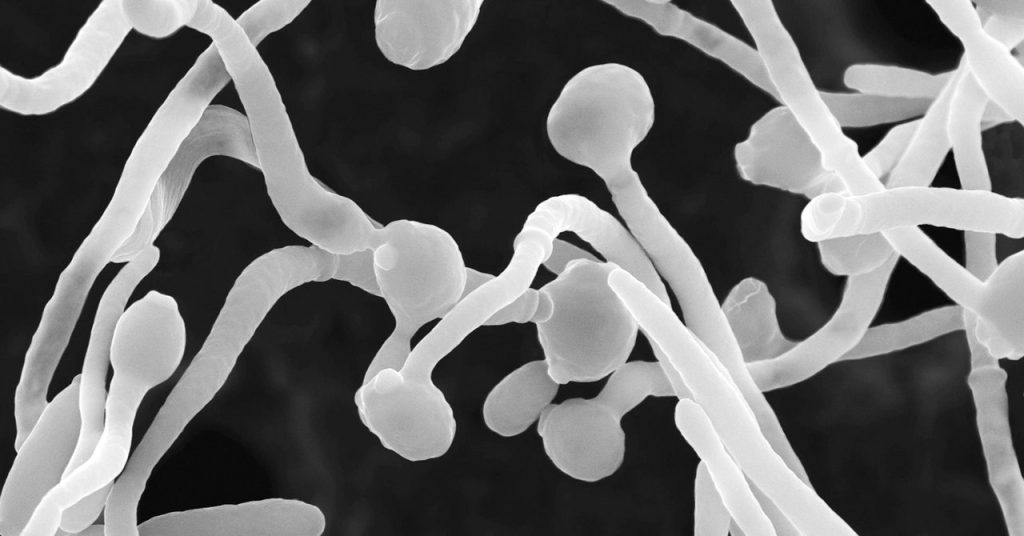The Gut Microbiome’s Role in Severe Covid-19 Infections
Fungi: A Crucial Component of the Human Microbiome
Fungi are a vital part of the human microbiome, working in harmony with other microorganisms to maintain overall health. However, when this delicate balance is disrupted, such as during a viral infection like Covid-19, fungi can overgrow and lead to more severe symptoms and complications.
Concerns Raised by the Pandemic
Iliyan Iliev, an immunologist at Weill Cornell Medical School, immediately recognized the potential for fungal co-infections in Covid-19 patients. As the pandemic unfolded, his concerns were validated by emerging research.
Gut Fungi’s Impact on Immune Response in Severe Covid-19
In a study published in Nature Immunology, Iliev and his team found that certain gut fungi strains, thrown off-balance by the virus, triggered a prolonged immune response in patients with severe Covid-19. This response could persist long after the initial infection and potentially contribute to lingering respiratory symptoms.
The Microbiome: A Delicate Ecosystem
Ken Cadwell, an immunologist at the Perelman School of Medicine at the University of Pennsylvania, compares the microbiome to a rainforest ecosystem. Just as cutting down too many trees or introducing invasive species can disrupt the balance, changes in the gut microbiome can lead to disease.
Investigating Fungal Antibodies and Overgrowth
Iliev’s team analyzed blood samples from 91 Covid-19 patients, measuring antibodies against various fungi to determine if the immune system was reacting to them. They discovered significantly higher levels of anti-fungal antibodies in patients with severe Covid-19, particularly against Candida albicans, a common cause of yeast infections. Fecal samples from hospitalized patients confirmed the presence of these fungi in their guts at higher levels than in uninfected controls.
The Role of Neutrophils in Severe Covid-19
The researchers found an increased presence of certain neutrophils, a type of white blood cell that fights infection, in patients with severe Covid-19. When mice were infected with Candida albicans strains from these patients, they generated more fungal antibodies and neutrophils. Treating the mice with the antifungal drug fluconazole reduced both neutrophil numbers and fungal antibodies, indicating that fungal overgrowth contributed to the increase in neutrophils.
Long-term Effects on the Immune System
The impact of fungal overgrowth persisted even after patients recovered from Covid-19. Stem cells that create neutrophils had adapted specifically to target fungi, remaining active long after the initial infection. While it’s unclear whether this adaptation would be beneficial or detrimental in the long run, it suggests that patients’ bodies might be primed to overreact to future fungal infections.
The Gut-Immune System Connection
To understand how gut fungi could affect the immune system, the scientists investigated signaling molecules called cytokines. They found that IL6 was elevated in infected mice alongside increased neutrophils and fungal antibodies. Blocking IL6 reduced both neutrophils and fungal antibodies, suggesting that cytokines may mediate communication between the gut and the immune system.
The gut is not like Las Vegas. What happens in the gut does not stay in the gut.
Alessio Fasano, a gastroenterologist at Massachusetts General Hospital, emphasizes the interconnectedness of the body and the potential for personalized medicine based on these findings. Measuring fungal antibodies in Covid-19 patients could identify individuals who might benefit from antifungal treatments.
The Importance of Microbiome Balance
However, the researchers caution against blaming a single fungal strain for disrupting the immune system. The microbiome is constantly changing, and restoring balance after an infection is crucial. Overusing antibiotics or antifungals can lead to a cycle of imbalances where one issue leads to another.
Future Directions: Long Covid and Immune Reprogramming
Iliev and his team are now interested in exploring how fungal overgrowth may manifest in long Covid and its long-term impact on immunity. Understanding the consequences of immune system reprogramming by fungi and viruses could provide valuable insights into the lasting effects of severe Covid-19 infections.

2 Comments
So now we’re blaming fungi for COVID complications? Wild times!
Guess it’s time to watch what we eat during a pandemic, huh?